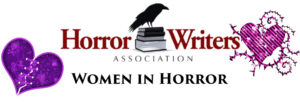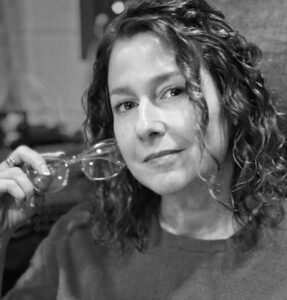Women in Horror: Interview with Rebecca Rowland


Rebecca Rowland is the dark fiction author of two fiction collections, one novel, a handful of novellas, and too many short stories. She is the curator of seven horror anthologies, including the best-seller Unburied: A Collection of Queer Dark Fiction and 2023’s American Cannibal. Her speculative fiction, critical essays, and book reviews regularly appear in a variety of online and print venues, and her most recent releases include the satirical horror novelette Shagging the Boss. The former acquisitions and anthology editor at AM Ink Publishing, Rebecca manages the small, independent publishing house Maenad Press and is an Active member of HWA and a reticent member of the New England writers’ group Whip City Wordsmiths. Find her at RowlandBooks.com or on Instagram @Rebecca_Rowland_books.
What inspired you to start writing?
My parents taught me to read before I entered school, and they encouraged me to keep reading. I don’t know of any writer who wasn’t a voracious reader first. I was always an awkward, anxious kid, and reading was an invaluable escape for me; writing just seemed to be the next logical step.
What was it about the horror genre that drew you to it?
My mother had five younger siblings, and her youngest sisters were still teenagers when I was little. My aunts took me to movies and museums, told me fairy tales and endless stories from mythology. I look back now and realize that much of what they shared with me had some sort of dark, fantastical element, whether it was General Zod and his co-conspirators terrorizing Earth in Superman II, the Supreme Being chasing down time bandits in Terry Gilliam’s film, or all of the creatures—not to mention deities and human characters—in the classical canon. I still love those things today. As a young adult, I fell in love with Clive Barker’s Midian monsters, and while I don’t think I understood why then, I realize now, looking back, that I was drawn to them because they were beautiful misfits: dark and powerful but resonant. I think that’s the attraction of horror for me. It’s darkly beautiful. Scary, sure, and that is part of the fun, but I like writing about the terrible beauty within the horror even more.
Do you make a conscious effort to include female characters and themes in your writing and if so, what do you want to portray?
I often make a conscious effort to create female characters who live outside of traditional, conservative roles, whether it’s through their sexuality or in the roles they fulfill in their everyday relationships. I was asked once if I consider myself a feminist writer. My answer is, sometimes. Sometimes I write feminist horror, sometimes I write queer horror; sometimes I write satirical horror, and sometimes, it’s a mish-mash of all three or none at all. If we are going to expect fiction to be diversified, we need to give authors the freedom (and acceptance) to write what they wish to write, not just what is expected of them because of their gender or sexuality.
What has writing horror taught you about the world and yourself?
Fiction writing forces the author to climb into a character’s skin, wear it for weeks (or even months or years), and stretch it out: to really see the person’s motivations from every angle so that the arc feels authentic. If the story is inspired by, or at least catalyzed by, personal experience, that exercise forces authors to take closer looks at themselves, what drives their own behavior, maybe even what’s shaped them to become the people they are today. Has that happened to me? Yes, most definitely.
Beyond that, however, writing horror has taught me something much less mind-blowing about the world. That even today, horror is an underrated—and underestimated—genre. Most of the time, when people ask what I write or curate and I tell them, I am met with eye rolls or condescending smirks. For some unknown reason, horror is considered a “lesser” form of literature by people outside of the speculative genres. I’ve made peace with that: I no longer care about the dismissal. I love this genre. Those who wave it off as a lesser art are simply missing out (or perhaps, missing something within themselves).
How have you seen the horror genre change over the years? And how do you think it will continue to evolve?
I recently wrote a reimagining of Stephen King’s “The Boogeyman” for a tribute anthology. Rereading his Night Shift collection, and that story in particular, made me hyperaware of how female characters appeared in the 1970s—not just in horror fiction but in all media. Women, LGBTQ+ individuals, and people of color have made significant strides in the last fifty years, and that’s reflected in how they are portrayed in horror fiction today. Art reflects the time period in which it is created, so I think horror will continue to grow and reinvent itself just as society has and will.
Who are some of your favorite female characters in horror?
Wow: that is a full-blown essay prompt! The short answer is, in film or television, Aliens’ Vasquez (when I saw that V. Castro wrote a book specifically about her, I was over the moon!), Nadja from the What We Do in the Shadows series, and most recently, Shauna (both as a teen and as an adult) in Yellowjackets. In literature, Millicent of My Lovely Wife by Samantha Downing, Maggie of Beasts of Vissaria County by Douglas Ford, and poor Violet of “Big Momma” by Joyce Carol Oates. With the exception of Violet, all of these women are smart. Some are salty, some are sociopathic, but all of them are engaging. That’s what makes a good character, no matter the gender.
Who are some women who write horror you recommend our audience check out?
There is so much innovative work being produced by authors who eschew social media for the most part: Elin Olausson’s recent collection, Growth, for instance; E.F. Schraeder’s poetry and nonfiction (and co-edited charity anthology In Trouble), and all of the deliciously transgressive horror penned by Grindhouse Press owner C.V. Hunt (who identifies as nonbinary). Social media has become the primary place for us to discover new fiction, but to be honest, I don’t like being smothered by constant promotion of a work, and I’m much more likely to avoid a book if I feel like it’s being shoved down my throat. These three authors may speak softly on social media, but the caliber of their work speaks volumes.
What is one piece of advice you would give horror authors today?
In this tech-saturated landscape, don’t lose your humanity. When negotiating the jungle of social media, promotion, and networking, don’t get pulled into the muck. I do not have a Twitter account, and I limit my time on Facebook groups these days. I’m sure that makes me a fool, career-wise, but I feel somehow cleaner because of it. Ironically, for all of our advances, not having to deal with others face to face has returned our world to an especially savage form of barbarism. The online world has gone amuck with merciless sharpshooting, public stoning, and mob justice. Never forget: there are real people reading your posts and comments, your fellow authors aren’t just rungs on a ladder, and reaching a pinnacle doesn’t make you a deity. With all of the pressure on social media to keep up with the Joneses, it can be tempting to trade a moral compass for a quick ego boost, but remember that after hours of staring at that screen, it’s your own reflection you have to look at in the mirror each night.
And to the women who write horror out there who are just getting started, what advice would you give them?
Don’t let outsiders dictate what kind of horror you want to create. Just because you write a piece of feminist fiction one month doesn’t mean you shouldn’t pen a femsploitation tale the next. Write what moves you; write the kind of horror you want to read. Don’t let reviewers and rule-makers pack you into the box they’ve fashioned. This is your art. Be proud of what you’ve created.




Wonderful read! Thanks, Rebecca!
Love this! Great interview, Rebecca!
Excellent interview! You can’t go wrong with Rebecca!